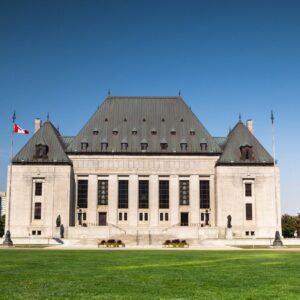Sheila Copps Moderates Panel on Strengthening of Canada’s Environmental Laws

Stephen Hazell
Director of Conservation
and General Counsel
On October 25, Nature Canada, West Coast Environmental Law Association, MiningWatch Canada, and Ecojustice hosted a reception and panel discussion on Parliament Hill to discuss reforms to Canada’s environmental assessment laws. Our groups firmly take the view that the current process is not working for the public, Indigenous peoples, industry or the environment (hello Trans-Mountain and Energy East pipeline projects!) leading to conflict, uncertainty and environmental risk.
The panel was moderated by Hon. Sheila Copps, a former Deputy Prime Minister and Minister of the Environment, who introduced the session by stating that bringing the federal environmental assessment law into force in 1995 was one of her most important achievements in public life.
Jonathan Wilkinson, Parliamentary Secretary to the Environment Minister, opened by summarizing the government’s perspective, noting that the federal government intends to introduce new legislation to assess the impacts of proposed development and policies into the House of Commons later this year or early 2018. Speakers on the panel included Anna Johnston, West Coast Environmental Law Association; Pierre Gratton, Mining Association of Canada and Sara Mainville, Olthuis Kleer Townshend LLP; who brought forward environmentalist, industry and indigenous perspectives on the legislative reforms that are needed., Linda Duncan, NDP Environment Critic, and Bob Sopuck, Conservative member of the House of Commons Environment Committee, also provided the perspective of their respective parties.
The hosting groups, including Nature Canada, take the view that the new law should include the following elements (among others!):
- Sustainability Approach – A new law must include a legislated test, criteria and trade-off rules that determine whether proposed undertakings are the best option for achieving environmental, economic and social sustainability (including climate commitments). A sustainability approach to assessing impacts will lead to better natural resource development, and not just development that is less bad.
- Triggering of Projects – A new law must require assessment of all proposed undertakings that are significant to the achievement of federal environmental commitments such as those under the Paris Climate Agreement and the Biodiversity Convention. High-carbon projects, projects proposed for National Parks and National Wildlife Areas, and projects requiring federal regulatory approvals under key environmental laws such as the Fisheries Act and Species at Risk Act must be assessed by law.
- Legal Entrenchment of Strategic and Regional Impact Assessment – A new law must include a legislative framework for assessing the sustainability implications of proposed federal policies (Strategic Impact Assessment) and the cumulative effects associated with alternative development scenarios in regions facing significant pressures (Regional Impact Assessment).
- Single Federal Agency – A new law must establish a single independent agency responsible for the conduct of federal impact assessments. The National Energy Board, Canadian Nuclear Safety Commission, and offshore oil and gas boards should not authority to conduct impact assessments.
The event was a great success with 100 participants, including as many as twenty Members of Parliament and several journalists.
My sense was that the event put environmental assessment law on the radar screen for political Ottawa, which is where it needs to be!


